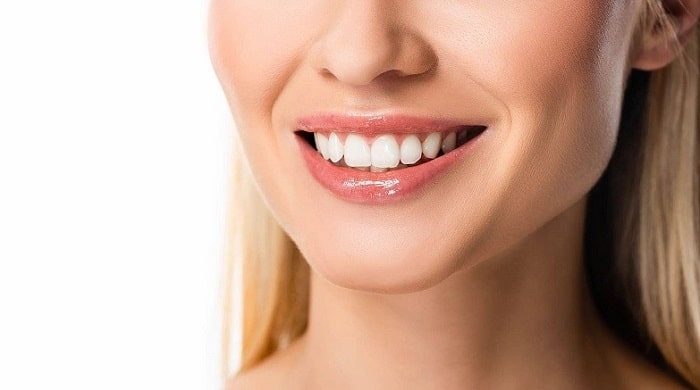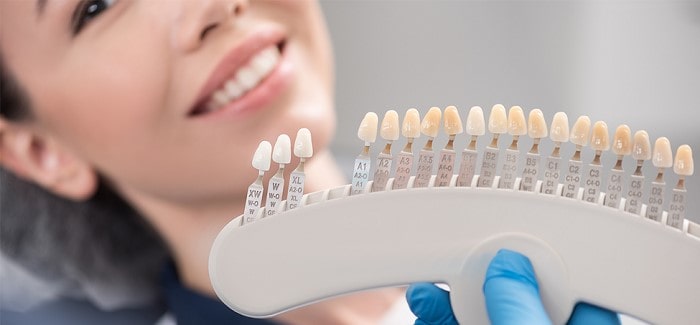A Dental Veneer is a layer of material that covers the outside surface of a tooth to provide a much more attractive appearance. Overall, this is an aesthetic solution. A patient’s worn teeth can be restored with a veneer procedure, provided there is a reasonable amount of good enamel on the tooth for the veneer to bond.
While most people think of veneers as a single treatment, there are actually several different types of veneers available. These range for higher-end permanent solutions like porcelain veneers to temporary cosmetic solutions like snap-on veneers.
What Are Veneers?

Dental veneers are thin, tooth-colored shells that are attached to the front surface of teeth to improve their appearance. They’re often made from porcelain or resin-composite materials and are permanently bonded to your teeth.
Some people may only get one veneer in the case of a broken or chipped tooth, but many get between six to eight veneers in order to create an even, symmetrical smile. The top front eight teeth are the most commonly applied veneers.
Why Do People Get Dental Veneers?
There are a number of reasons that dental patients opt for veneers. They aren’t getting the results they wanted from traditional whitening. Veneers can be used to treat a number of different cosmetic concerns, including chipped, broken, discolored, or smaller-than-average teeth.
Individuals decide to get dental veneers because they want a white, even smile that looks and feels natural but does not require constantly applying and removing prosthetics, which may become lost or damaged, or getting dental implants.
If you are curious about getting dental veneers, the best course of action is to discuss your treatment plan and approach with a dentist. He or she can explain what you should expect in terms of veneer placement, cost, time for the procedure, and specific maintenance afterwards. If veneers might not be a good fit for your dental needs, they will also be able to make alternative dental treatment suggestions so that you can still enjoy a bright, even smile.
How To Choose The Best Teeth Veneers?
Veneers come in several colors and materials, but whichever material you opt for, veneers are designed to be thin, stain resistant, and durable enough to withstand the natural wear and tear your teeth go through on a daily basis. Here we’ll look at the most common kinds of veneers and the pros and cons of each.
Composite Veneers

Composite veneers are favored by some patients because of their cost-effectiveness. They can also usually be placed in just one treatment, reducing your need for numerous dental visits. Some of the other advantages of this type of veneer include:
- They require less tooth preparation as compared to other veneers
- The cost is typically half of that of porcelain veneers
- High quality composite veneers can look natural
One of the most common treatment options, composite veneers are applied and sculpted during your appointment with the dentist. They are typically used to fix small cosmetic issues, such as chipped or cracked teeth, but they can be used to fix slightly crooked teeth or to fill small gaps between front teeth.
Composites are substantially cheaper than the likes of porcelain veneers, and involve a far shorter treatment period. The treatment can usually be completed in a single visit, although it may be a longer appointment than normal.
The downside is that the finish often isn’t as good as you would get from porcelain veneers, and they aren’t as resistant to staining and discolouration. Regular polishing can keep them looking great, and as long as your daily dental hygiene is good they should last a long time.
Porcelain Veneers

These are often the veneers of choice for patients who want to make small alterations to their teeth, or change the tooth shape, size, and color. Some of the benefits of porcelain veneers include:
- They’re thinner compared to other veneers
- You can enjoy a very natural tooth appearance
- With proper care, porcelain veneers can last up to 15 years
- In most cases, none of the natural tooth has to be shaved down
Porcelain veneers are usually the most expensive option, but the transformative effect they can have on a person’s smile makes them well worth the investment. The treatment will involve multiple appointments, with the initial preparation work being done with your dentist and the creation of the veneers taking place at the dental laboratory.
They are created specifically for your unique set of teeth and will be custom-tailored to your individual tooth colour and shape. They are resistant to staining and are the ideal solution to more severe discolouration, chips or cracks, and they generally last much longer than other types of veneers.
The downside is the expense, which is much higher than other types of veneer. Porcelain veneers also require much more initial preparatory work and usually require some drilling and reshaping of your original teeth underneath. Repairing and replacing damaged porcelain veneers can also be more expensive and time-consuming than other veneers.
Instant Veneers

Instant veneers are somewhere between porcelain and composite veneers. They involve the dentist applying a pre-made veneer to your teeth, rather than a custom made one. There are multiple different styles and shades available based on the commonly accepted best look for teeth, and your dentist will match the style and shade to your own teeth.
This treatment is far less expensive than porcelain veneers as the lab fees are removed and the process can usually be completed in a single visit. The pre-made veneers also mean you’re not relying on the ability of your dentist to sculpt the tooth like you would with composites.
The downside is that you’re not getting a custom made veneer, but for the most part the aesthetic results will be largely similar. While instant veneers are fairly stain-resistant, you won’t get the same long term results you would get from porcelain.
Removable Veneers

The final option is removable or snap-on veneers. These are a relatively new solution and are sometimes known as a snap-on smile. They are made from a hard-wearing dental resin to form a thin but strong cover that you wear over your existing teeth to give the appearance of a perfect smile. You can eat and drink as you normally would, and simply remove and clean them when you’re finished.
The dentist will take an imprint of your existing teeth and you can choose the look and shade of teeth you’d like on your snap-on veneers. You’ll then have a custom made perfect smile that can be worn as needed, and it’s a great alternative for those unable to afford extensive cosmetic treatment or who are not suitable candidates for implants or veneers.
While they are inexpensive and look fairly good, it’s by no means a long-term solution for existing dental issues. If you have chipped or cracked teeth, are missing multiple teeth, or have discolouration issues then proper dental work will be required to fix the underlying problems.
How To Know If Dental Veneers Are The Best Choice For Me?

Veneers do not require surgery, don’t carry the cost of more serious procedures like implants, and have a more lasting effect than traditional tooth whitening methods. Tooth whitening methods can also be inexact – depending on your lifestyle and what you eat and drink, the effects of a whitening session may fade quickly.
Veneers, on the other hand, are styled and colored before they’re even applied, ensuring that dental patients with veneers always have beautiful, natural-looking white teeth rather than very bright – and potentially very quick to darken – results from whitening sessions. Veneers also don’t cause the discomfort and sensitivity that many whitening patients note after a whitening session.
How To Prepare For Your Appointment?
Before you get your veneers, you’ll have a preliminary appointment with your dentist to discuss which options are right for you and how many veneers you want to have placed. In some cases, if teeth are crooked or uneven, you may need to have braces before your dentist can place the veneers.
Your dentist will often take X-rays at this stage to evaluate your teeth’s health. They’ll look for signs of tooth decay, gum disease, or the need for root canals. If you have any of these conditions, you may not be a candidate for veneers.
To get accurate sizing for your veneers, at the next appointment, your dentist trims down about a half a millimeter of your tooth (they remove the enamel using a grinding tool) before they take a mold (impression) of your teeth. This mold is then sent off to the lab for the creation of your veneers.
How To Take Care Of Your Veneers After They’re Placed?
Unlike other dental procedures, the recovery process doesn’t take an extended amount of time. Instead, once the veneers are cemented on and any anesthetics wear off, you can eat and chew as you normally would. While the anesthetic is wearing off, be conscious of not chewing on your cheeks or tongue.
In some cases, immediately after the veneers are applied, you may notice that they feel a little rough. These rough spots (usually from extra cement that can adhere to the veneer) wear down after several days of normal eating and teeth brushing; if they don’t, your dentist can smooth them out.
Traditional porcelain veneers typically last between 10 and 15 years, and no-prep veneers last around 5 to 7 years. Taking certain precautions can help make sure that you get the longest lifespan out of them possible. These precautions include:
- Don’t chew on hard objects like pens, ice, or your finger nails.
- Never use your teeth to open packaging or condiment packages.
- Try not to chew with your front teeth. Eat harder foods with your back teeth only; cut up hard foods like chocolate bars so that this is possible.
- If you grind or clench your teeth at night, get a splint or retainer to protect your veneers.
- If playing sports, you must wear a mouth guard.
How Much Do Veneers Cost?
The cost of your veneers depends on factors like what type of veneers you’re choosing, what brand name your dentist has available, your area’s cost of living, and the expertise of the dentist.




